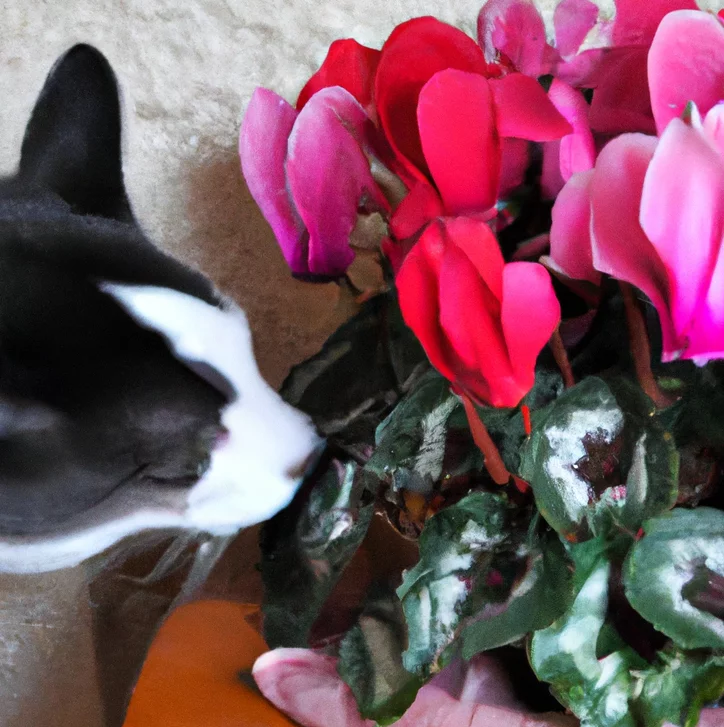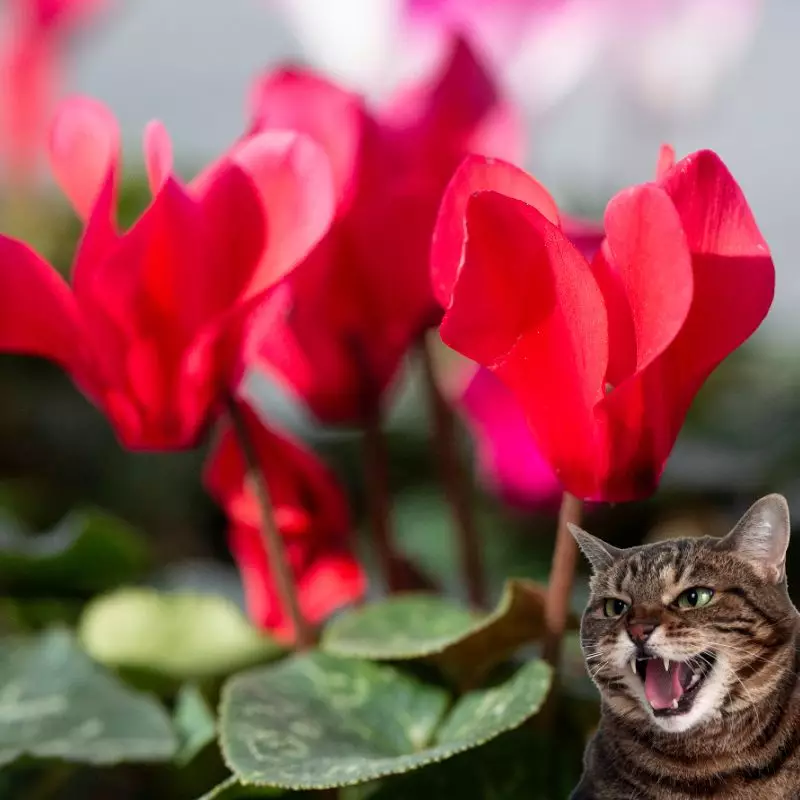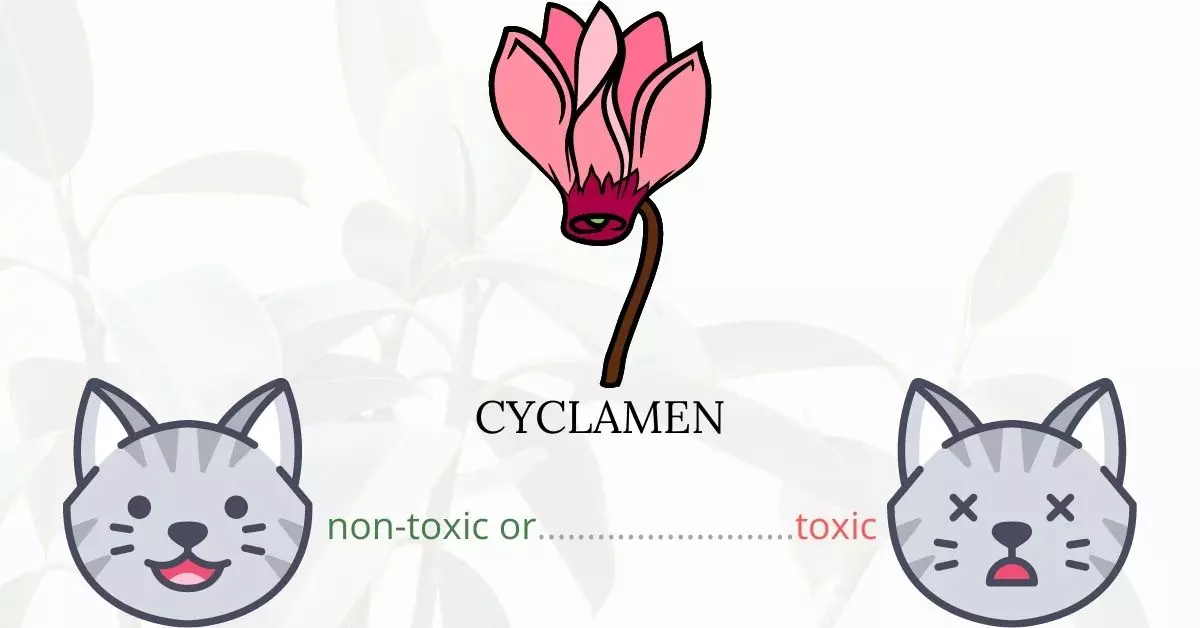Yes, Cyclamen, commonly known as sowbread, is toxic to cats. This plant, popular as a flowering houseplant, contains terpenoid saponins, particularly concentrated in the rhizomatous tubers that grow below the soil. Ingesting large doses can result in significant cardiac rhythm disturbances, convulsions, and in extreme cases, death. Fortunately, because these tubers are buried beneath the soil and have a repugnant taste, it is rare for cats to consume them.
This article has been crafted in collaboration with a team of experienced DVMs (doctors of veterinary medicine). Their expertise ensures that we provide accurate and up-to-date information regarding the potential risks of various plants, including Cyclamen, to cats. Additionally, we have meticulously researched high-authority sources such as the ASPCA and PetMD to ensure comprehensive coverage on every plant we discuss.
Clinical Signs of Cyclamen or Sowbread Poisoning in Cats

If your cat comes into contact with, smells, or consumes parts of the Cyclamen plant, especially the tubers, they may exhibit certain clinical signs. Understanding these symptoms and their causes can help in quickly diagnosing and treating Cyclamen poisoning.
- Hypersalivation: This occurs as a direct response to the irritants in the plant. The cat’s body produces excess saliva in an attempt to flush out and neutralize the toxic compounds.
- Diarrhea, which may be bloody: The terpenoid saponins in Cyclamen can irritate the digestive tract, leading to diarrhea. In more severe cases, this can be bloody due to the irritation causing minor internal damage.
- Vomiting: This is another way the body attempts to expel the harmful substances ingested.
- Abdominal pain: The irritation of the digestive tract can cause discomfort and pain in the cat’s abdomen.
- Lack of appetite: Feeling unwell and the irritative effects of the toxin can lead to a reduced desire to eat.
- Bloody urine: This suggests that the toxin may be affecting the kidneys or urinary tract, leading to blood in the urine.
- Gastroenteritis: Inflammation of the stomach and intestines due to the irritation caused by the plant’s toxins.
In cases where a large quantity of Cyclamen has been consumed or if the more toxic roots were ingested, severe clinical symptoms can emerge:
- Abnormal heart rate and rhythm: The terpenoid saponins can directly impact the heart’s functionality, leading to rhythm disturbances.
- Seizures: Resulting from the effect of the toxins on the brain and central nervous system.
- Ulcerative gastritis: Severe inflammation and ulceration of the stomach lining due to prolonged exposure to the toxin.
- Paralysis: An extreme neurological reaction to the toxins which impacts the cat’s motor functions.
- Terminal convulsions: Severe and final stage neurological disturbances caused by the toxin’s effect on the nervous system.
- Death: In extreme cases and if not treated in time, the cumulative effects of the toxin can be fatal for the cat.
It’s crucial to be vigilant and seek veterinary care immediately if you suspect your cat has ingested or come into contact with Cyclamen.
First Aid and Treatment of Cyclamen or Sowbread Poisoning in Cats

If your cat has eaten only a few leaves or blooms, try to rinse any residual plant matter out of the mouth with water. Cats that have consumed considerable portions of the plant or tubers require immediate veterinarian attention.
If the consumption was recent, the veterinarian can induce vomiting to clear the gastrointestinal tract of plant matter and inject activated charcoal to prevent future absorption. Intravenous fluids will be also given to your cat to prevent dehydration and electrolyte imbalances.
Recovery from Cyclamen or Sowbread Poisoning in Cats

If you get your cat to a veterinary clinic within 24 hours of eating a sowbread plant, it has the best chance of recovering. The longer you wait between ingesting this plant and seeking medical help, the lower your cat’s chances of recovery become.
Prevention of Cyclamen or Sowbread Poisoning in Cats
Avoid bringing or growing cyclamen in your household. Research first or ask your veterinarian if a plant is safe for your cat before purchasing or growing it. Keep an eye on your cat especially when he or she is outdoors. You can also restrict your cat from going outside by confining him in a cat house or by building fences and installing safety nets around your house.
If you love plants but have cats at home, check out these lists:





